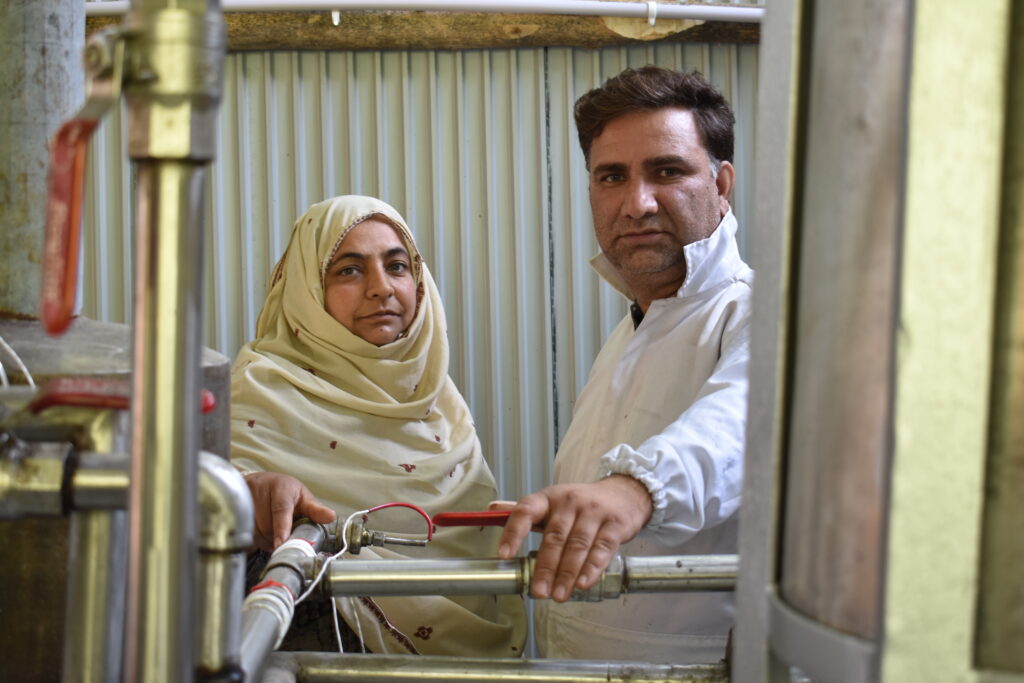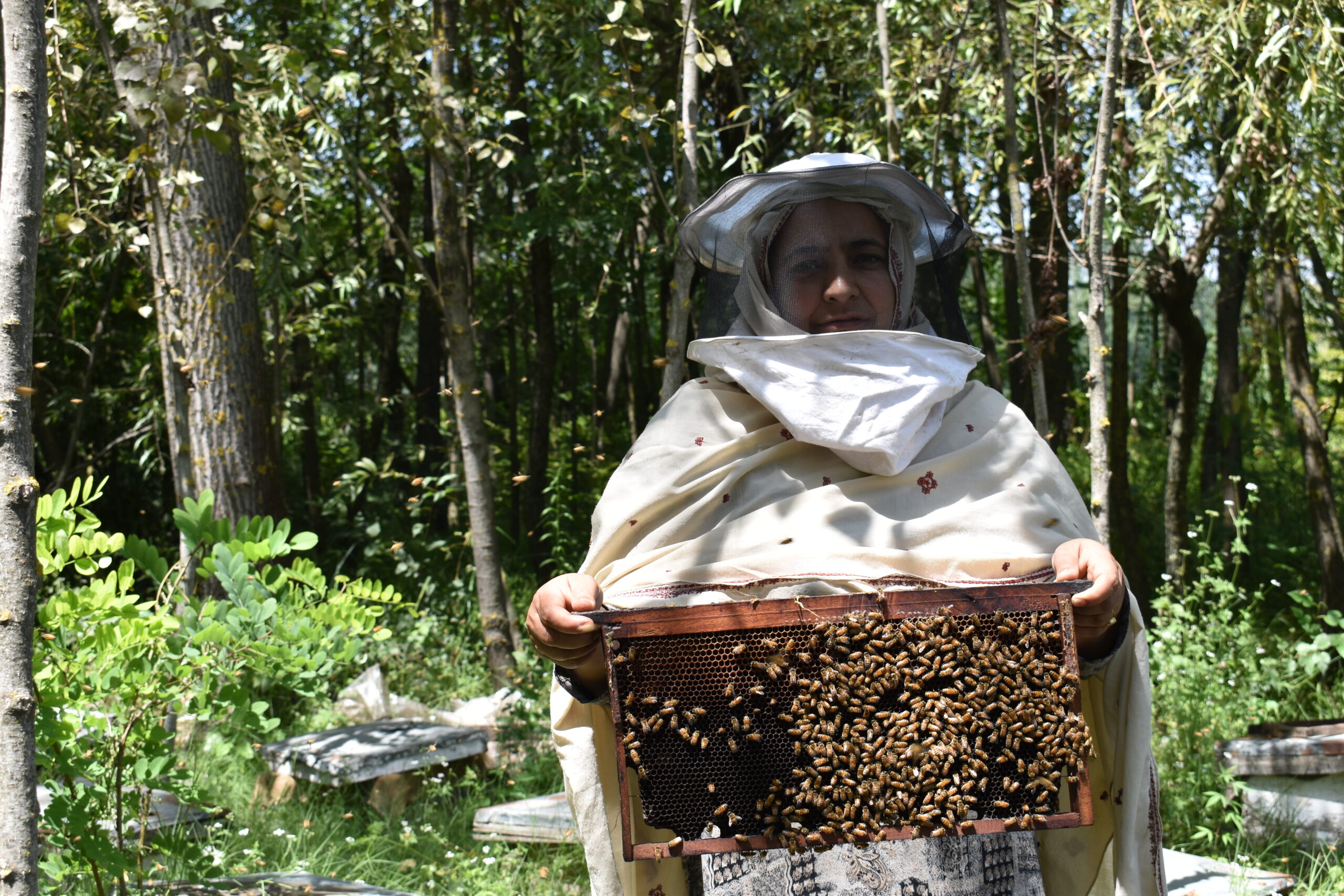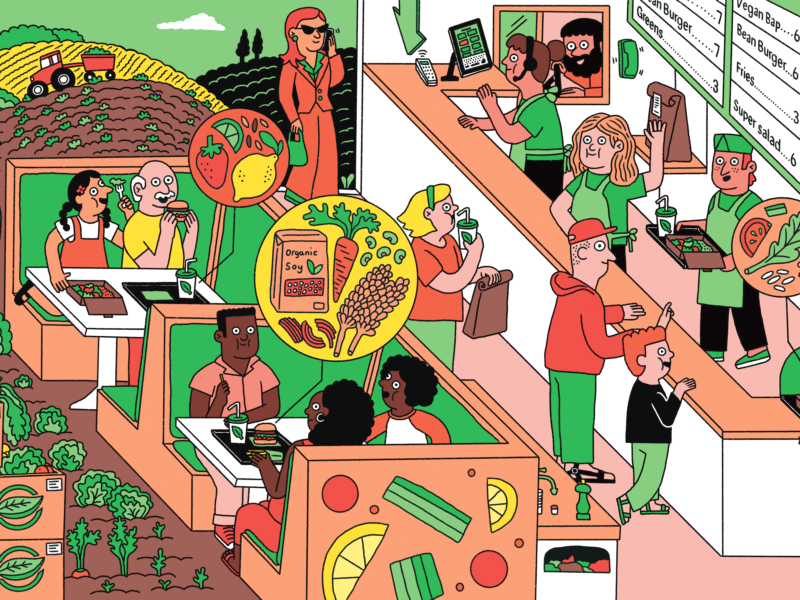Famous for its delicious honey, Kashmir has seen a decline in artisanal apiculture due to a confluence of political and environmental factors.
GANDERBAL, KASHMIR –Clusters of beehives dot the sprawling lawns outside the Rizvi family home in the Kashmiri village of Shalhar. Bees swarm the flowers and suck the marrow out of colorful petals. Towseefa Rizvi, 49, clad in protective gear, walks toward her hives; she manages 200 colonies of Apis mellifera, often referred to as the European or western honeybee. This district, located about a half-hour’s drive from Srinagar, boasts diverse flora, sprawling apple orchards, and extensive forests that are the reason Kashmir is famous for its uniquely delicious honey.
“I had never thought of doing something like this,” she says, gently opening a hive. “But this unusual job has both challenged and fascinated me.”
A mother of three, Rizvi has been beekeeping for more than a decade. She taught herself the necessary skills by researching online, watching and consulting with local apiarists, and through trial and error. In addition to running her own honey production busines, she now trains and supports new apiarists, especially women in her community. Beekeeping is a popular enterprise, she explained, because startup costs are low.
The average annual turnover from Rizvi’s 200 colonies is about $10,698 (monthly income in rural Kashmir is between $66 and $133). She retains an income of about $4,012 and puts the difference back into the business.
This part of Kashmir is deeply conservative. Women typically look down while walking outdoors; they do not speak in public or visit the homes of strangers unless accompanied by a male family member. Rizvi’s decision to become the first women in her district to launch her own business, let alone in this traditionally male-dominated occupation, was thus deeply unusual. But her husband, Syed Parvaz, 42, has supported her from the beginning; he is now a production manager in Kashmir Valley Agro Industry, which includes their honey-making business (Jammu and Kashmir is the only place in India that produces a rare variety of wild bush honey, he explained.) The couple are committed to releasing the untapped potential of the honey production industry in their region.
Inspired by Rizvi’s example, an increasing number of women from poor families are starting their own apiaries. They look up to her for showing them an income-earning business that they can run from home, a fact that was particularly relevant during the pandemic lockdown. Rizvi and her husband have registered around 500 beekeepers and have trained thousands of beekeepers in neighboring districts.
“I tell them if I can be an entrepreneur with limited education and skills, why can’t they,” says Rizvi. “I started beekeeping when there were hardly any women in the trade, but now we have so many around and if we cannot inspire and support each other then it would be our collective failure.”
The pandemic provided Rizvi with unexpected opportunities. During the lockdown she launched an online school to teach beekeeping, and then a website to sell a variety of products ranging from honey to herbal tea mixtures. She also renewed her commitment to sustainable farming practices, starting with cultivating her own vegetables to compensate for soaring prices and spotty access to markets. Bees, she pointed out, play “a major role” in sustainable agriculture.

Some hope that, with an infusion of knowledge and skills, beekeeping could help revitalize Kashmir’s economy.
Unemployment in the territory is the highest in India, a fact that has particularly hurt people younger than 35, who are 70 percent of the population, and women—72.6 percent of whom are without work. More than two years of political upheaval, military curfews, the longest internet blackout in history, and then the pandemic lockdown, have had a devastating impact. The Kashmir Chamber of Commerce and Industries estimates that the regional economy has lost $7bn since 2019.
But the road to expanding beekeeping into a lucrative business is littered with obstacles, explained Sajad Hussain Parey, professor of entomology at Baba Ghulam Shah Badshah University. The government provides no social security to beekeepers—i.e, they are not insured—or training in modern methods. Most traditional beekeepers are unaware of critical skills like seasonal hive management and bee pollen collection. As a result, honey production is low; a lack of marketing opportunities further undermines the earning potential of beekeeping. Quality control is also a problem, said Parey, because there is no central institution to monitor and test the honey for purity.
But an infusion of government funding could unleash the potential of Kashmir’s honey industry. What’s needed are training and market access to allow sustainable exploitation of Kashmir’s climate and natural vegetation. With honeybees around the world becoming increasingly vulnerable to climate change and the chemicals used in industrial apiaries, training local people in artisanal beekeeping and modern scientific methodology could create significant employment opportunities. A return to sustainable beekeeping methods would also encourage ecological awareness and rural development, promote small village industry, increase biodiversity —and could double farmers’ income from fruit and vegetable cultivation by complementing it with beekeeping.
Since almost everyone in Kashmir has a house and land, they have the space and means to engage in small and medium scale beekeeping at home, with minimal financial investment.
The regional government is working to generate new business opportunities in the production of bee byproducts like beeswax, propolis, bee venom, and royal jelly. In addition, it is attempting to expand the apiculture sector by increasing the number of beekeeping units, obtaining a GI tag for the region’s honey, and helping farmers increase their incomes by introducing modern technological methods.
Parvez and Rizvi have begun working on Integrated Pest Management to train apiarists in protecting their bees from pests and predators.
“A person should be confident to take care of bees,” says Syed, adding that the couple is in constant touch with institutions, research departments, and independent beekeepers across the world. Through their networks they are learning about skill training, trust building measures, and procurement of plants and machinery, as well as how to diversify their honey products and expand their market opportunities. By setting up sales outlets, they are also learning how to improve the income and employment of the beekeepers, assure sustainability and inspire more young unemployed people to take up the craft.
Rizvi explains that her ambition goes beyond just growing her own business. “The participation of more and more women in this field is my dream,” she said, adding that she is working to create “a sustainable revenue opportunity” for local people.
As Rizvi prepares to inspect her hives, which she does during the evenings, when the bees are less aggressive, she puts on her protective cap and coat. “A blooming garden is my office,” says Rizvi as bees buzz and hum in the hive. “And bees are like my family.”



